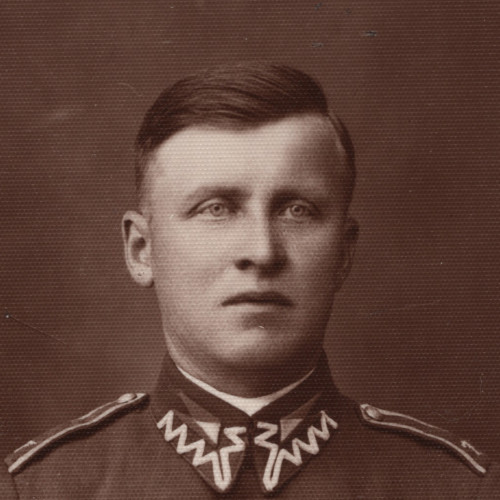Kazimierz Przekora - Instytut Pileckiego

Commemorated on 26 April 2022 in Huta Mińska
Kazimierz Przekora was born on 14 August 1900 in Włodawa. Most of his youth was spent during the First World War and the struggle for Polish independence. In 1918, he volunteered for the newly-formed 7th Lublin Cavalry Regiment, with whom he fought during the Polish-Soviet War. After the fighting ended, he decided to continue his military career, moving to Mińsk Mazowiecki, where the unit’s garrison was stationed.
In 1922, he became a professional non-commissioned officer. During more than 20 years of military service, Kazimierz Przekora became known as a conscientious and dutiful soldier. His commitment was also evidenced by the decorations he received, including the Cross of Valor, the Bronze Cross of Merit and the Bronze Medal for Long Service. When Germany invaded Poland in 1939, Kazimierz Przekora and the second echelon of the 7th Lublin Cavalry Regiment took part in battles in the Lublin region. After the September Campaign and the dissolution of the unit, he settled in Huta Mińska.
On 15 November 1924, long before the war, Kazimierz Przekora married Helena Miąsek, who lived in Huta Mińska. The couple had two children, Henryk and Wanda, but their joy as a family was cut short by Helena’s untimely death. Przekora remarried in 1940, this time to Władysława Książek.
The German invasion brought long years of bloody occupation. Ubiquitous repression and terror devastated Polish society. The Jewish population faced the greatest persecution. In Mińsk Mazowiecki, about 40% of the population had been Jewish during the interwar period; the Germans established a ghetto there in October 1940, cramming more than five thousand Jews into it. Less than two years later, in August 1942, they began to liquidate the ghetto, sending most of the victims to the Treblinka extermination camp. During the operation, they shot about a thousand people. Those who managed to avoid execution or deportation began a dramatic struggle for survival.
In the summer of 1943, three Jews, probably escapees from a labor camp in Mińsk Mazowiecki, knocked on the door of Kazimierz Przekora’s house, asking for shelter. Despite the death penalty for anyone who gave any kind of help to the Jews, Przekora took them in. He arranged a hiding place in the basement, beneath the kitchen floor. Kazimierz’s daughter, Wanda, saw on many occasions how her father and her stepmother Władysława served food to the hidden Jews.
On 2 July 1943, the Germans, led by the infamously cruel gendarme Friedrich Gutberlet, organized a raid covering the villages of Huta Mińska, Cielechowizna and Gliniak. They also issued an order for all men to report to the schoolyard in Gliniak. Before he left home, Kazimierz Przekora warned the hiding Jews of the danger. His daughter Wanda hid at her aunt’s house nearby. While local residents were being held at the schoolyard in Gliniak, several German gendarmes searched Kazimierz Przekora’s house and found the hiding place. One of the Jews attempted to escape through the nearby fields, but was immediately shot dead. The gendarmes then shot the other two men on the ground of the local manor.
Meanwhile, at the Gliniak schoolyard, Kazimierz Przekora was accused of hiding Jews. Despite the village leader’s intercession, the gendarmes led him behind the school, toward the fields, where, according to witnesses, he was shot by Gutberlet himself.
Kazimierz Przekora’s body was buried in the cemetery in Mińsk Mazowiecki. The final resting place of the Jewish men remains unknown to this day.